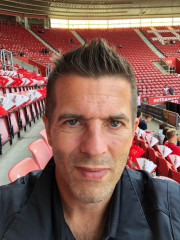Derby time: Liverpool Football Club vs Manchester United
There is no greater rivalry in English football than between these two clubs, Manchester United and Liverpool FC. Although Liverpool has the Merseyside derby between with local city rivals Everton and Manchester has the derby between United and City, the Premier League clash between Manchester United and Liverpool is considered the biggest derby in England.
But how did this rivalry between the clubs, whose cities are almost 55 kilometers apart, come about? The origin is not to be found in football at first, but you have to delve a little deeper into the regional and economic history of both cities.
The industrial revolution
The Industrial Revolution (1750-1900) initially brought the two cities closer together. Manchester was fueled by the cotton industry, which met the country's growing need for textiles. Liverpool, on the other hand, had begun to develop into a major seaport, importing and exporting a wealth of goods from home and abroad. And so both cities benefited from each other.
Tension between Liverpool and Manchester arose when the Manchester merchant community decided to begin construction of the Manchester Ship Canal. This canal was designed to link Manchester to the sea, avoiding the Liverpudlians' taxes and duties. The resistance of Liverpool politics was in vain. And with the completion of the Manchester Ship Canal in 1894, the working-class hostilities between the Liverpool docks and Manchester factories began.
In the same year, on April 28, 1894, the first football derby took place between Liverpool and Manchester. In a play-off game, Liverpool defeated Newton Heath (former name of Manchester United) 2-0 and Liverpool knocked the Manchester team out of the first division.
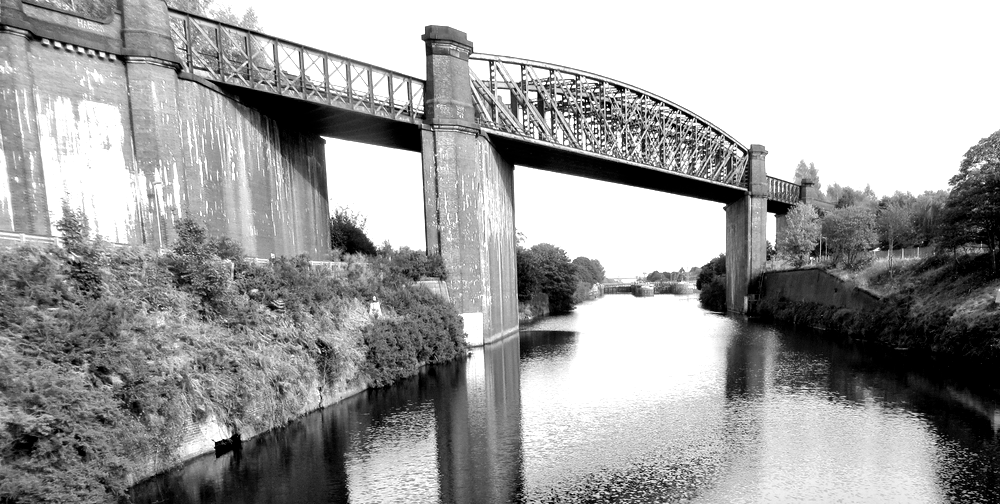
The Manchester Ship Canal, completed in 1894, connects the city to the sea. Photo: Shutterstock
A year and a half later, on October 12, 1895, Liverpool celebrated a 7-1 win in a second division game, the highest win in derby history to date. At the end of the season, Liverpool won the league and thus rose to the first division.
The founding of Liverpool FC and Manchester United
Manchester United was founded in 1878 as Newton Heath LYR F.C. and renamed to Manchester United F.C. in 1902. Old Trafford has been the home ground of Manchester United since 1910.
Liverpool FC was founded in 1892 by John Houlding, who was initially a member of Everton FC. Houlding bought Anfield from his friend John Orell in 1892 and asked Everton, who had already played there, for a rent increase. Everton FC refused and left Anfield. They moved a mile down the road and built Goodison Park. Left without tenants, John Houlding decided in 1892 to start a new team. That team was Liverpool Football Club. To this day Liverpool fans still tauntingly chant "You should have paid the rent" to Everton fans.
The first years
In 1901 Liverpool FC won the Football League Championship for the first time and repeated this in 1906. In the same season, the newly renamed Manchester United rose to the top division after finishing runners-up to Bristol City in the second tier. Two seasons later, by which time Liverpool had slipped into mid-table, Manchester United clinched their first league title, winning the 1907/08 Football League by nine points over Aston Villa and Manchester City. They then went on to win the first-ever FA Charity Shield match in 1908, when they defeated Queens Park Rangers over two legs. They also won the FA Cup final the following season in 1909, followed by another league title and Charity Shield in 1911.
Two world wars interrupted the North West Derby
With the outbreak of the First World War, football was disrupted in England. After competitions resumed in 1919, Liverpool won the league while United were in a sharp downward trend that led to relegation in 1923. Between 1923 and the outbreak of World War II, neither team, apart from a few regional trophies, won the league or cup.
The late 1940s and early 1950s were dominated by austerity measures and rebuilding after the ravages of war. Both cities were heavily bombed by the Nazi Luftwaffe and football became a symbol of recovery and solidarity. Recovery, of course, took time, but eventually some normality returned and the rivalry was about to reach new heights. Both teams would become the true superpowers of English football over the next 70 years.
Munich Air Disaster & the Hillsborough Disaster
On February 6, 1958, tragedy struck at Manchester United. On the way home from a European Cup game at Red Star Belgrade, the Manchester United team had to stop over in Munich. In bad weather, the unbelievable happened at 3:03 p.m. On the third take-off attempt, the plane could not take off due to lack of speed, but was also too fast to brake in time and broke through the perimeter fence of the airport. An explosion ensued when the plane rammed into a garage storing gasoline. A total of 23 people died in the Munich Air Crash disaster including 8 Manchester United players.
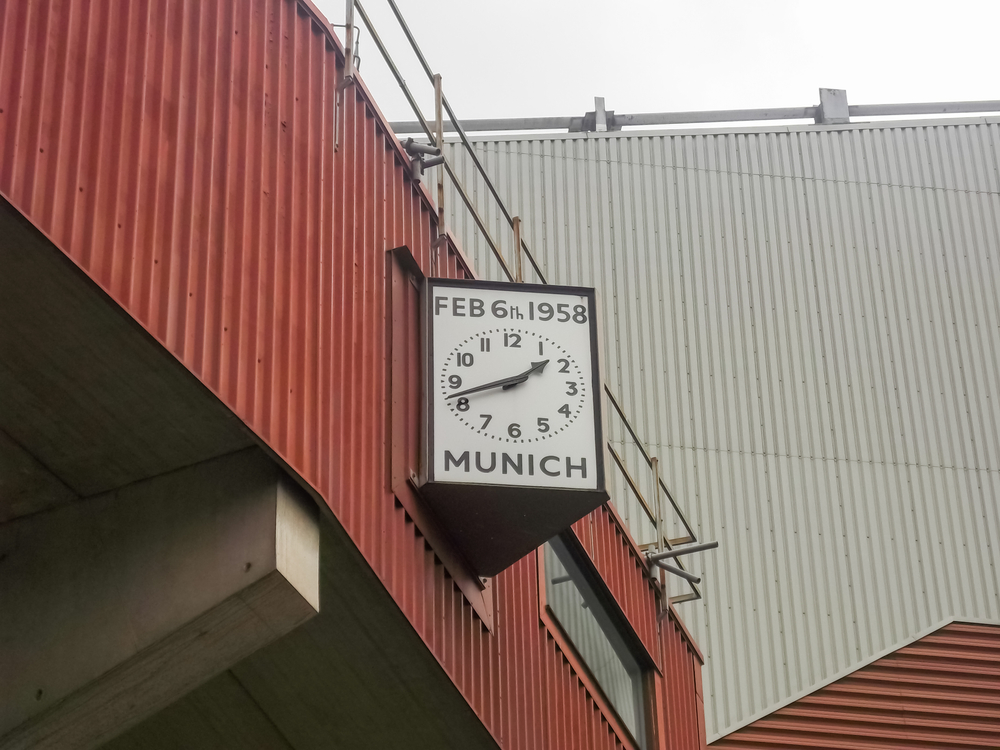
This clock at Old Trafford Stadium commemorates February 6th, 1958 - the worst day in Manchester United history. Photo: Shutterstock
All rivalries were put aside for a moment afterwards and Liverpool FC even offered Man United 5 of their players on loan to allow the team to finish the season. This mutual respect was reciprocated by Manchester in 1989 as 97 Liverpool fans died as the result of overcrowding in the FA Cup semi-final on 15th April 1989 at the Hillsborough stadium of Sheffield Wednesday.
The 60s
Following the Munich tragedy, Manchester went through a period of rebuilding with the club's manager Matt Busby who survived the tragedy. Six years later, in 1964/65, Manchester United became English champions again. Ten years after the crash, the club celebrated winning the European Cup for the first time in its history. The match took place at Wembley, where Manchester faced Benifca Lisbon. United defeated the Portuguese club 4-1.
The city of Liverpool also enjoyed musical fame with the formation of the rock band The Beatles. The success on the pitch was also in the making. With the arrival of Bill Shankly, who took over as Liverpool manager in 1959, the Reds continued to grow. They won the English Championship in 1964 and the FA Cup a year later.
It can be said that the sporting successes of both teams made football dynasties in English football in the 1960s. However, with the departure of Matt Busby as coach in 1969, Man Utd's sporting decline began and the 1967 championship was the last major success for the Manchester team for a long time.
Liverpool dominated the 70's & 80's
The following two decades were dominated by Liverpool FC and it was undoubtedly the most successful period in the club's history. Between 1972 and 1992, Liverpool won the league an amazing 11 times, achieved 19 cup victories (FA Cup, League Cup and Charity Shield) and won 7 European Cups. The worldwide popularity of the club also increased enormously as a result of these successes.
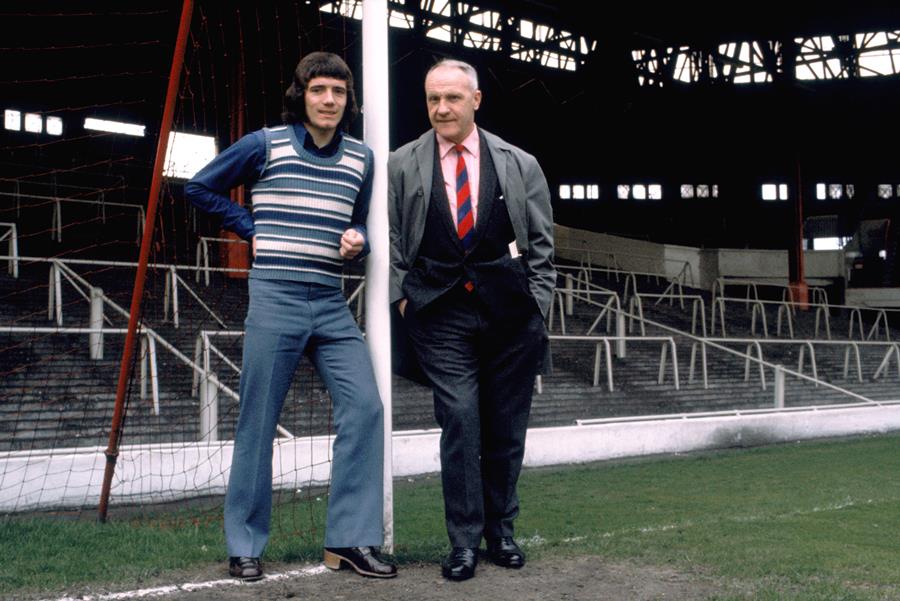
Kevin Keegan and manager Bill Shankly at Anfield in May 1971. Photo: PA Images / Alamy Stock Photo
Liverpool's international successes include lifting the UEFA Cup in 1973 and 1976. A year later the club also celebrated their first UEFA Cup Winners' Cup, a success which was repeated the following season. In the 1977 final, Liverpool beat Borussia Mönchengladbach 3-1. In the 1978 final they defeated Club Brugge 1-0.
Only in the late 1970s could Manchester United celebrate a couple of success over rivals Liverpool. The FA Cup victory in the 1977 final and the triumph over Liverpool in the FA Cup semifinals in 1979 at Goodison Park, the stadium of Liverpool's city rivals Everton, put the Man U fans in a good mood.
In the 1980s Liverpool won two more European Cups, the first in 1981 against Real Madrid. In the final, Alan Kennedy scored the goal in the 82nd minute. The second was in 1984 against Roma at their home stadium, the Stadio Olimpico, where Liverpool won 4-2 on penalties.
Manchester United dominated the 90s and 2000s
It took 26 years for Manchester United to win the English championship again. In the 1992/93 season United won the newly formed Premier League Championship. Then came the glory days of Manchester United under legendary Scottish manager Sir Alex Ferguson. This time it was Liverpool who had to wait exactly 30 years for the next championship (from 1990 to 2020). During that time, Manchester United have won the Premier League a whopping 13 times, 23 English Cup victories and 5 European trophies.
Only two consolations remained for Liverpool at this time. Though the term „consolation“ for winning the Champions League in 2005 and 2019 is a gross understatement. The final of Istanbul 2005 remains legendary when Liverpool seemed hopelessly trailing 0-3 against AC Milan at half-time. A second-half rush to score three goals in just six minutes saw the team into extra time followed by penalties in which Liverpool keeper Jerzy Dudek was the hero. In 2019, Liverpool won the Champions League again under coach Jürgen Klopp at Atlético Madrid’s Wanda Metropolitano. It is also thanks to Jürgen Klopp, who took over as coach at LFC in 2015, that history is now turning for the better for Liverpool fans. By winning the Premier League title in 2020, the German coach fulfilled a long-awaited dream of Liverpool fans and made himself immortal on Merseyside.
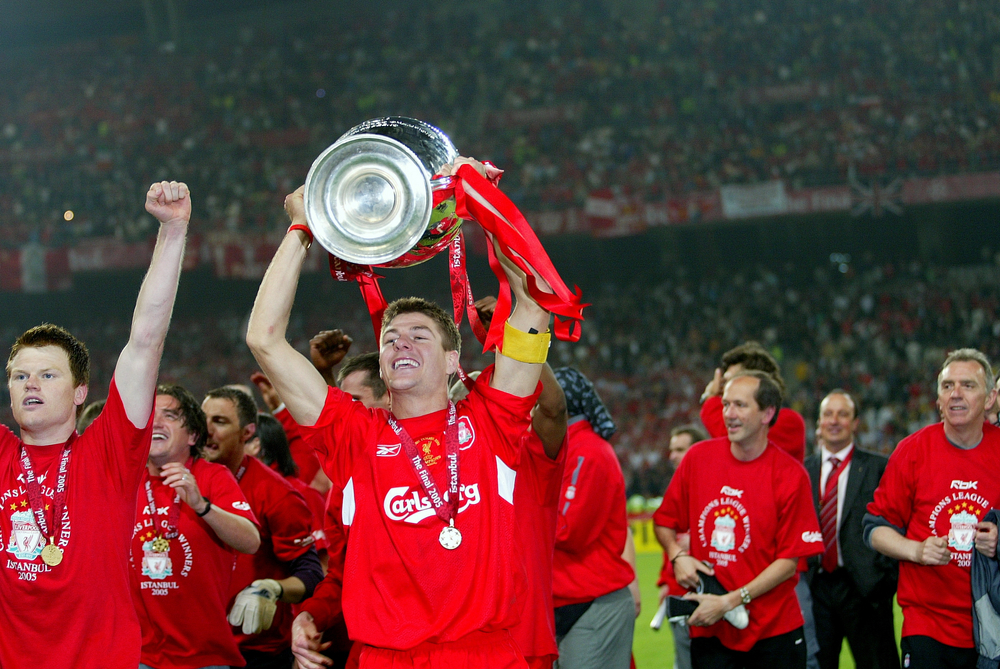
Another Liverpool legend - Steven Gerrard holds the Champions League trophy into the Istanbul night sky on May 25, 2005. Photo: Shutterstock
Alex Ferguson kept pouring fuel into the fire
Over the years there have always been taunts between coaches and players of both clubs. Alex Ferguson's probably best-known saying was recorded in an interview in 2002: "My greatest challenge was knocking Liverpool right off their fucking pole. And you can print that!
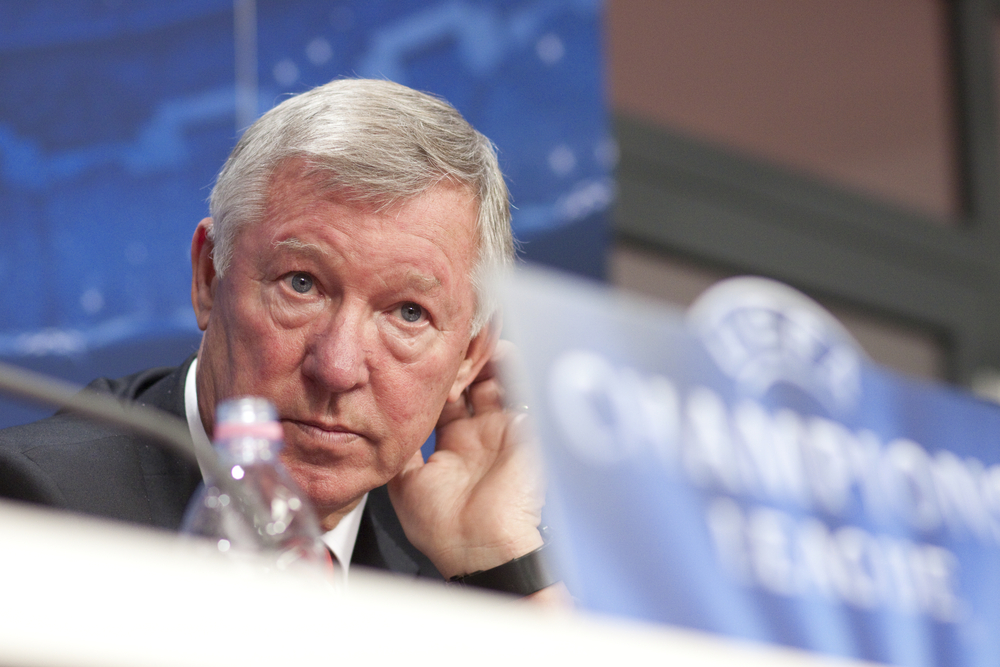
Sir Alex Ferguson knew only too well how to use the animosity of the two rivals to motivate his team. Photo: Shutterstock
One thing is certain, Alex Ferguson never forgot the 'fuck you' taunts that echoed from the home team's dressing room after a particularly bitter defeat at Anfield in April 1992. That day's defeat extended United's woeful run without a title to a quarter of a century. A Liverpool supporter then approached young Ryan Giggs for his autograph outside the stadium. Giggs wrote his name on a piece of paper - and the fan tore it up in front of his face.
The following season, Ferguson hung a photo — Dante's Inferno, as he called it — on the dressing room wall that showed the distraught faces of his players in the previous season, telling them it was there to "make sure it that something like that never happes again". And of course, United ended up winning the league.
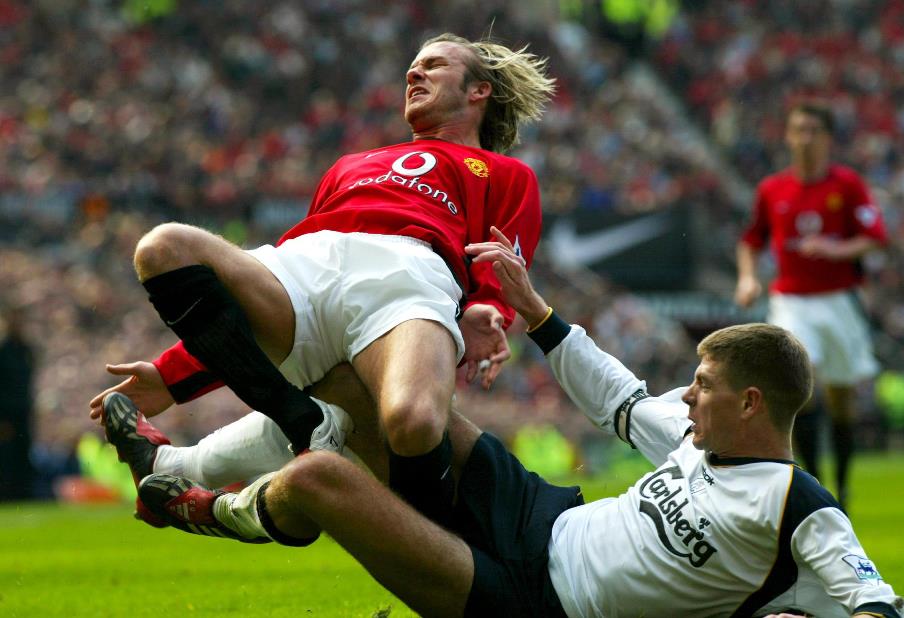
Liverpool's Steven Gerrard "clears" Man United midfielder David Beckham from behind in the North West Derby April 5, 2003 Credit: PA Images / Alamy Stock Photo
However, Liverpool still led 18-7 in league titles and a fan banner in the Kop Stand clearly challenged Manchester United fans: “Come back and sing ‘Ooh‑Aah Cantona’ when you’ve won 18!'
Then in 2009, United fans returned with their own banner: 'You told us to come back when we won 18 – we are back!“
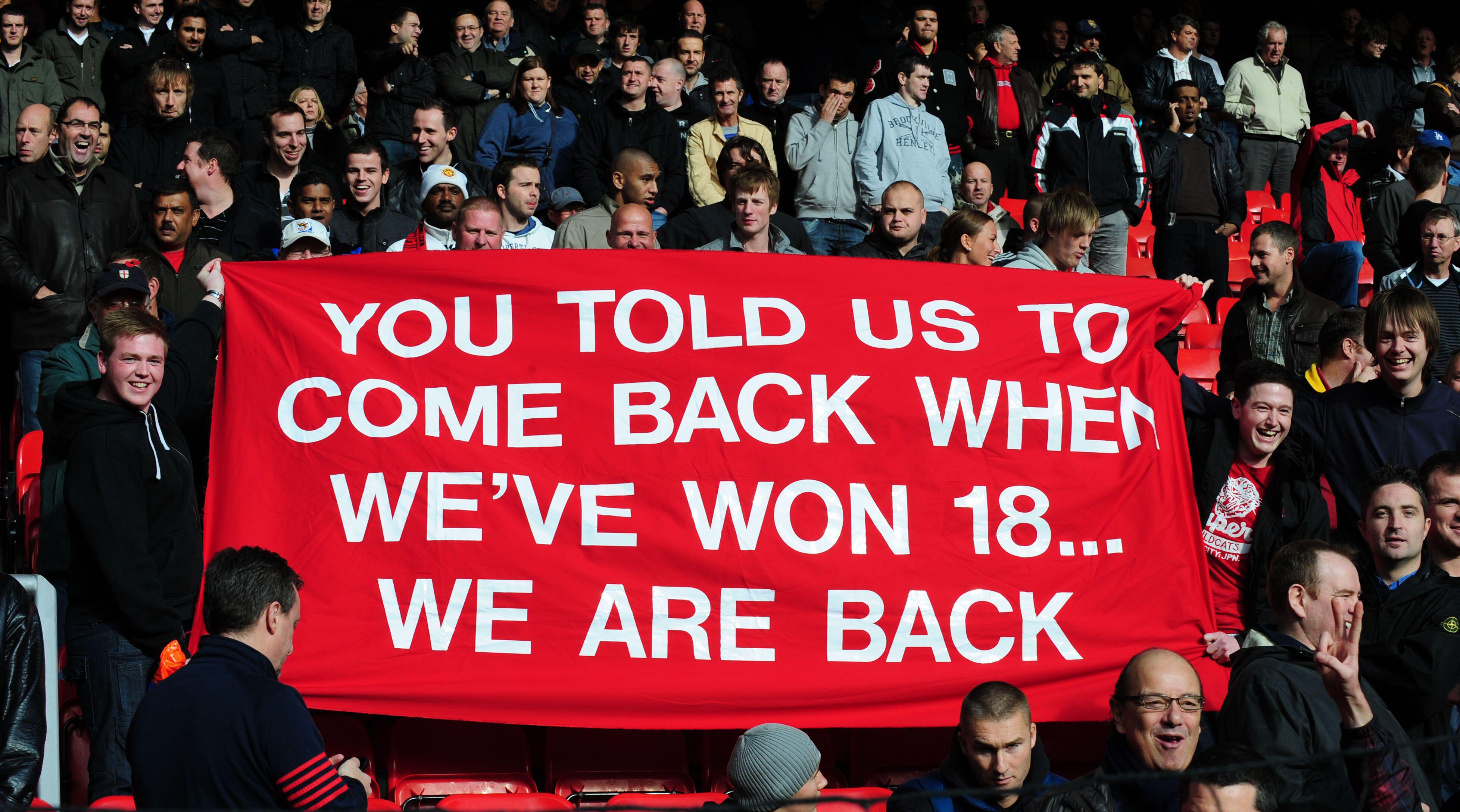
Manchester United fans taunt Liverpool fans at Anfield in October 2009. Photo: Sportimage / Alamy Stock Photo
Tony Wilson – TV presenter and self-confessed Liverpool hater
Another story is told about the late TV presenter Tony Wilson, who was a self-confessed Man United fan. Every time he talked about Liverpool FC on TV, he would grimace, roll his eyes or show complete disgust. Such was his dislike for Liverpool that on the eve of Liverpool's 1978 European Cup final against Club Brugge he presented the preview with a Club Brugge rosette. However, this did not bring luck to Club Brugge as Liverpool won the final anyway.
Bob Greaves, Tony Wilson's co-host, once said in 1983: "The phrase I always heard when I drove to Liverpool - as soon as I got off the train or got out of my car - was: 'Hey, Bob, tell that Tony Wilson, he’s a wanker!“
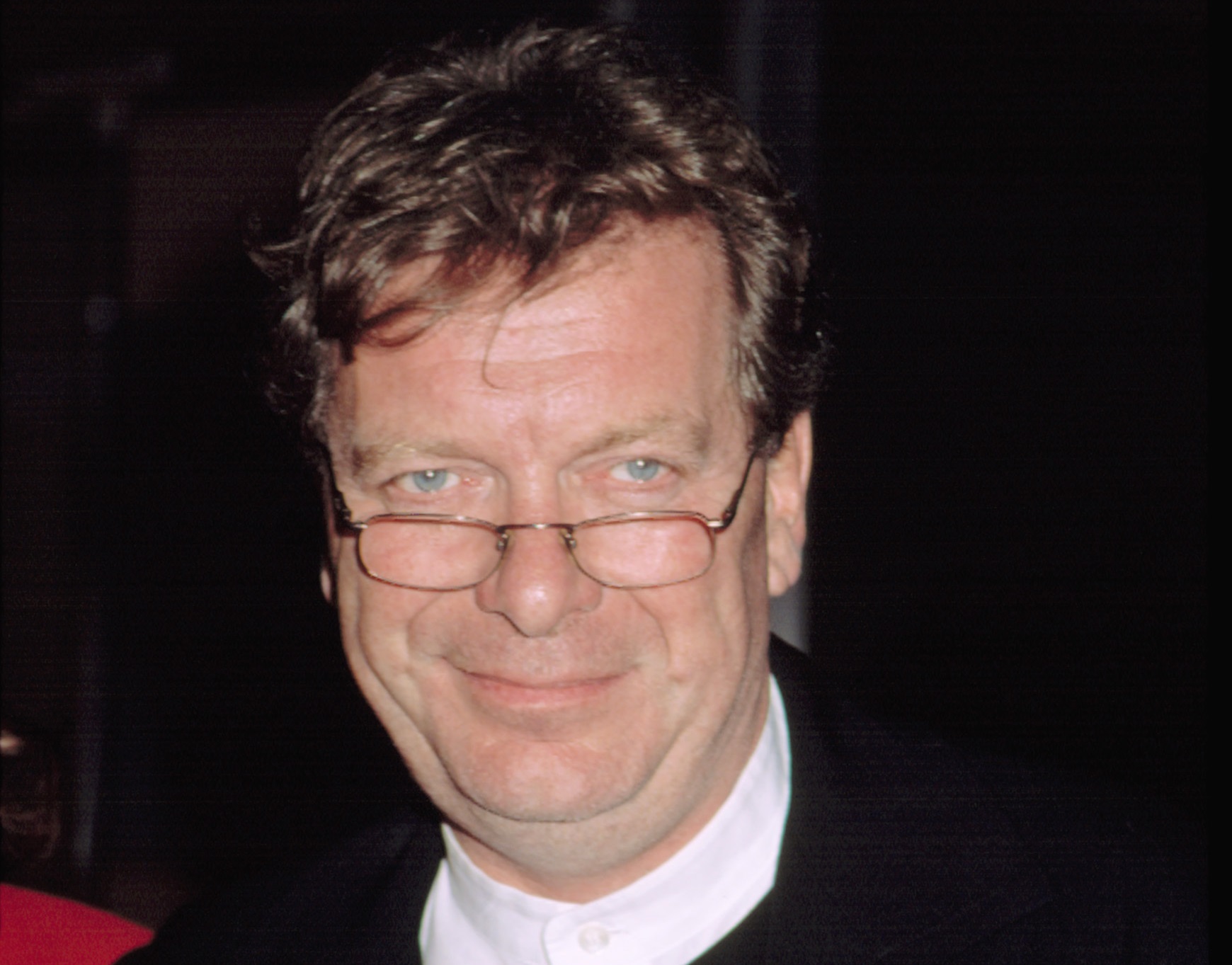
Tony Wilson was a fervent Manchester United fan and best known in England for the Granada Reports - He died in 2007 at the age of 57. Photo: Shutterstock
Greaves also shared a particularly hilarious incident involving Wilson and Liverpool fans. He (Greaves) received a phone call from Merseyside (Liverpool) Police Department and was asked to inform Wilson that his brand new Jaguar had been stolen and found in Liverpool. And so Wilson got on the train and headed to Liverpool to collect his stolen car. He drove his car back to Manchester and parked it again in front of Granada Studios, where he works.
Three hours later, Greaves received another call: "Sergeant Carruthers here again. Can you tell Mr. Wilson his car is still here on Eckersley Avenue?”
The Scousers (Liverpoolers) had secretly followed Wilson back to Granada Studios, stolen the car again and parked it in the same spot in Liverpool! No damages. No lost items. Just mind games. Wilson also had to acknowledge this and reluctantly paid tribute: "Gotta say, man, good scam!"
"Worse than Vietnam"
In 1986, emotions ran high among fans when the United team bus arrived at Anfield. A brick hit the window near Mark Hughes. Then, as the United players entered the stadium, they were sprayed with tear gas. Several children were injured and had to be taken to hospital. After the tear gas incident, United manager and playing legend Ron Atkinson described a trip to Anfield as "worse than Vietnam". The pre-match events, as well as attacks on fan buses by United supporters, prompted a concerted effort by both clubs to quell riots at future clashes. In 1986-87 the directors of both clubs met with media representatives in Manchester and Liverpool and drafted a peace plan. This included opposing mascots leading the teams, representatives from each club traveling on the opposing team bus and joint events for the fans. Only, it didn't work.
Stories the Derby wrote
Manchester United 2-1 Liverpool, 1977
With the league title secured and the European Cup final looming, Liverpool were the clear favorites in the FA Cup final at Wembley – even among the Man United players.
"We weren't confident," admitted Man United striker Stuart Pearson. "We knew we would push them to the limit, but they were so good."
But with a lot of will and passion, it was Manchester United who prevailed in this exciting final. The game was won by Lou Macari's deflected shot after Jimmy Case had leveled Man United's opener from Pearsons.
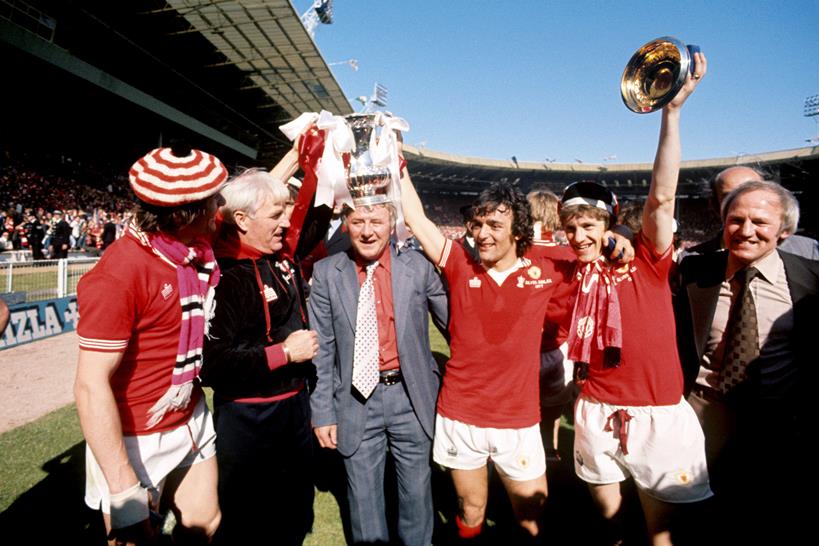
1977 FA Cup Final - Liverpool vs Manchester United - Wembley Stadium. Manchester United Manager Tommy Docherty (centre) celebrates the FA Cup with Lou Macari (third right) and Gordon Hill (second right). Photo: PA Images / Alamy Stock Fto
Manchester United 1-0 Liverpool, 1996
Another FA Cup final, one in which Liverpool made history as the infamous 'Spice Boys'.
Jamie Redknapp, Steve McManaman & Co arrived at Wembley in ridiculously white suits and were sent home after 90 minutes, during which Eric Cantona scored the winning goal of the day with five minutes left much to the delight of the Man United fans.
Victory also meant Sir Alex Ferguson's side became the first team to win the league and cup twice.
After the game, United coach Ferguson said: "I knew straight away that we were going to beat them today after seeing their white suits!"
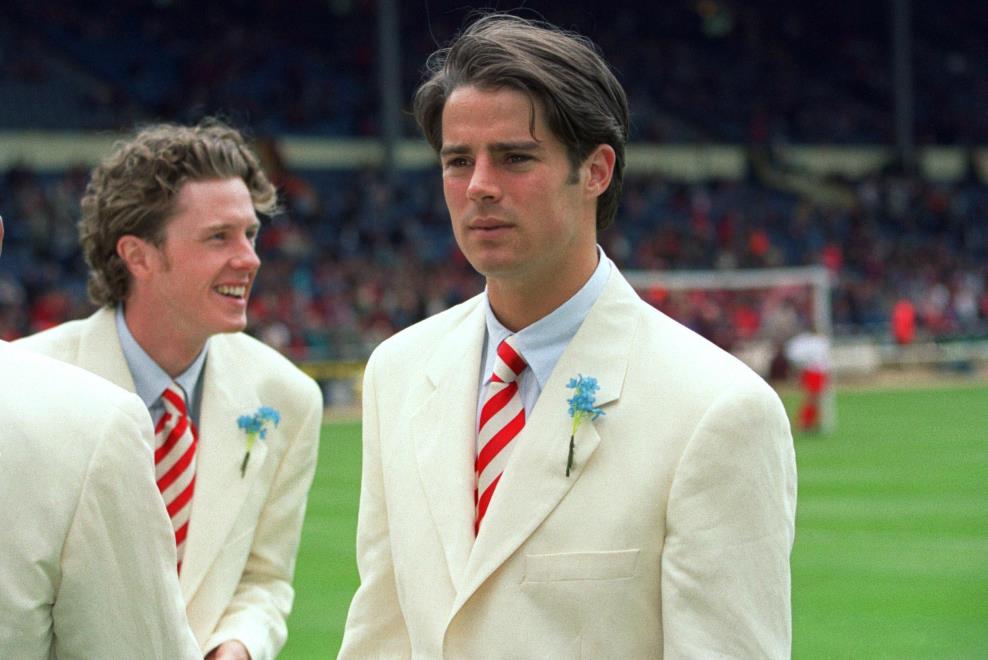
Spice up your life - Steve McManaman and Jamie Redknapp before the 1996 FA Cup Final in the infamous white suits. Photo: PA Images / Alamy Stock Photo
Manchester United 3-2 Liverpool, 2010
United fans argue that Dimitar Berbatov was worth his £30million just alone for his performance that day at Old Trafford.
The Bulgarian scored an incredible hat-trick, including an incredible overhead kick from the edge of the box that bounced off the crossbar back into keeper Pepe Renia and then into the goal.
Skipper Gerrard had put Liverpool back in the game scoring twice but Berbatov capped his virtuoso performance with six minutes remaining, heading in John O'Shea's cross and causing a frenzy at Old Trafford.
Manchester United 0-5 Liverpool, 2021
To describe the North West Derby's recent 5-0 defeat as a beating would be an understatement. That was the Old Trafford massacre; a game in which Liverpool seemingly stopped scoring on purpose so things wouldn‘t become even more embarrassing for Ole Gunnar Solskjaer's side.
Liverpool striker Mohamed Salah became the first opponent player in Premier League history at Old Trafford to score a hat-trick. Cristiano Ronaldo scored another offside goal for Man United and Paul Pogba was sent off 15 minutes after he came on for a foul on Naby Keita.
Thriving black market and official North West Derby tickets
The North West Derby is and will always be a favorite and it is highly unlikely that this game will not sell out. Tickets for Liverpool v Manchester United at Anfield and also for Manchester United v Liverpool FC at Old Trafford are in huge demand. The few seats in the stadiums that are not occupied by season ticket holders go to long-standing members. Of course, the black market also flourishes at such encounters, but the clubs are now rigorously proceeding against the so-called ticket touting and sale of unauthorized tickets on the Internet. It is becoming more and more common for fans to receive either blocked tickets or no tickets at all despite paying a fortune.
Football fans who still want to experience the North West Derby between FC Liverpool and Manchester United and do not want to buy tickets on dubious websites are left with only a few organizers and agencies that offer official hospitality tickets for Liverpool and Manchester United. EVENT-BREAKS.COM is one of the providers from whom you can safely purchase these tickets and travel packages with hotel + tickets.
